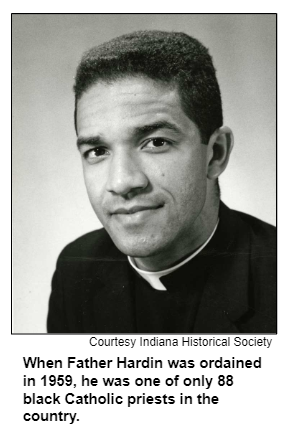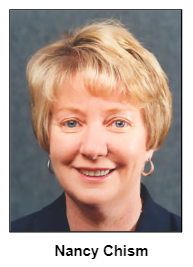Feb 14, 2020
(February 8, 2020) With what was often described as a "cloud of white hair" and a distinctive beard, Rev. Boniface Hardin would have drawn attention even if he had not emerged during the 1960s as one of the most prominent civil rights activists in Indianapolis.
As Hoosier History Live salutes Black History Month, we explore the impact of Father Hardin (1933-2012), the founder of Martin University, the only predominantly African-American institution of higher learning in Indiana. He was among the first wave of black students to attend St. Meinrad Seminary in southern Indiana during the 1940s and '50s; when Father Hardin was ordained in 1959, he was one of only 88 black Catholic priests in the country.
The nearly 50 years he was based in Indianapolis were eventful, to say the least.

In addition to Father Hardin's unflagging advocacy on behalf of disenfranchised people - and his crusade to provide new educational opportunities - he was well known in later years for his public re-enactments of one of his role models: 19th-century abolitionist Frederick Douglass, to whom he bore a remarkable physical resemblance.
To share insights about Father Hardin, who had a soft voice but a compelling, folksy speaking style, two guests join Nelson in studio:
- Nancy Chism, the author of a new biography of Father Hardin, Pickin' Cotton on the Way to Church (Indiana Historical Society Press). Nancy, who retired as associate vice chancellor of IUPUI, chairs Martin University's board of trustees.
- And Joseph Smith Sr., a retired
attorney and former parishioner at Holy Angels. His family had a
decades-long friendship with Father Hardin.
Father Hardin was born and grew up in Kentucky. He came to Indiana, as our guest Nancy Chism reports in her biography, after he was "excluded from the seminaries in Kentucky because of his race."

Martin University evolved out of Martin Center, a non-profit organization that Father Hardin founded; it offered workshops on racial harmony, programs for leadership development among African-Americans and a clinic dedicated to testing for and disseminating information on sickle-cell anemia, a severe hereditary disease that is most common among those of African descent.
"With typical disregard for the complexities entailed," Nancy Chism writes, Father Hardin decided that founding a university should be his next mission. He named Martin University (initially known as Martin College) in honor of Martin Luther King, Jr., and Martin de Porres, a Catholic saint who advocated for social justice.
Particularly in the early years, Martin's students primarily were adults who had not been able to attend college immediately after high school. By the 2007-08 academic year, Father Hardin's final term as president, 961 students were enrolled.